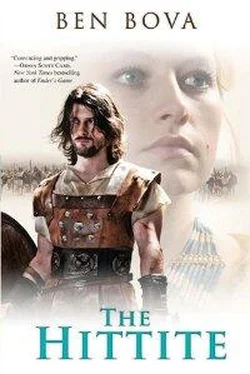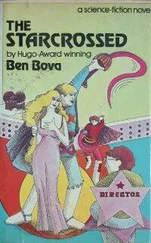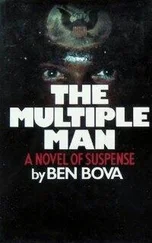I had to find them. My father had been right in that. In all this world of chaos and misery, my two sons were all that really mattered. I can’t let them spend their lives in slavery. I will find them, no matter how long it takes or who stands in my way.
What the wench called a village was a miserable collection of huts at a fork in the road we had been following. Worse, another raider band was already there. Several of the huts were ablaze, sending foul-smelling black smoke billowing into the bright morning sky. Magro and I lay concealed in a stand of half-grown wheat on a terraced hillside overlooking the village. The rest of my men were hunkered down on the other side of the knoll, out of sight.
“They don’t look like soldiers,” Magro whispered to me.
“Neither do we,” I answered.
“Bronze weapons,” Magro pointed out.
I nodded. They were bandits, then, not former soldiers. Only soldiers of the old emperor were gifted with iron swords. Each one was worth a man’s weight in silver.
“Looks like they’re ready to leave,” I whispered.
The bandits must have hit the village the previous day and spent the night, taking their fill of the food and wine and women. Now they had rounded up all the ragged, bedraggled people in the bare little patch of dirt that passed for a village square and methodically, one by one, slit the throats of any man young enough to fight. The women screamed and wailed, the white-bearded old men sank to their knees. The young men, their hands bound behind them, fell like sheep, unable to defend themselves. One of the women threw herself at the raiders but was knocked to the ground by a backhand cuff.
Once their grisly task was finished, the bandits piled as much loot as each of them could carry and staggered out onto the left fork of the road. The women ran to their slain sons and husbands, raking their faces with their nails to add their own blood to what was already soaking the ground.
“What now?” Magro asked me. “They’ve picked the place clean.”
Still watching the backs of the departing bandits, I answered him, “They’ve done half our work for us. Now all we need to do is take the goods they’ve collected away from them.”
“I counted twenty-seven of them.”
I nodded. “Most of them will run at the sight of us.”
“Twenty-seven,” Magro repeated, unconvinced.
It was easy to overtake the bandits. They were still half-drunk and encumbered with the loot they carried. We trailed them to a wooded area, where we could approach them unnoticed, screened by the trees and ground foliage, and fell on them savagely.
In a few moments it was all over. They were fatally surprised. I killed three of the louts myself. Zarton, our big farm boy from the Zagros Mountains, put away five of them—or so he claimed. I counted twenty-two bodies sprawled on the bloody ground. The others fled shrieking for their lives.
“Food, wine, clothing … they did well for themselves,” said little Karsh as we picked over the bundles the bandits had dropped.
“That village was richer than it looked,” Magro said.
“Pick it up, all of it,” I told the men.
“There’s too much! How can we carry all this?” Even Zarton, who towered over most of us, looked unhappy at shouldering such a burden.
“We won’t be carrying it far,” I told them. “We’re bringing it back to the village.”
“Bringing it back ?”
“We don’t need all this, and they’ll be very grateful to us for returning even half of it.”
They stared at me in disbelief. Only Magro seemed to understand what I was up to.
“You want to know which fork of the road leads to Troy,” he said to me softly as we trudged back to the village, laden with their goods.
I answered him with a nod. The men were sweating and grumbling, but I had to know which road the slavers had taken. I could not rest while there was still a chance that I might find my sons and my wife.
Would I have come so far if it was only my wife the slavers had taken? I wondered. She was a woman, and there are many women in the world. Yet she was the mother of my sons, and those two little boys were what drove me on. So I sought the fruit of my loins, driven by a dying old man’s will, while my men trudged unhappily back to the village the raiders had looted.
The villagers were indeed grateful, once they realized we intended to return some of their goods to them, rather than cause them more harm. They were a sad and pitiful lot, their young men still sprawled on the blood-soaked earth, their women still kneeling over them, crying and keening. The biting iron stench of their blood filled the air; if the women and old men did not get the corpses buried soon, there would be even worse smells.
The village’s white-bearded headman gladly told me that the right fork led toward Troy, but he had no idea how far the city might be.
“I have heard of it,” he told me, trying to maintain some shred of dignity in his quavering voice. “No one from this village has ever gone there.”
No one from this village has ever gone farther than the wheat fields and dung-spattered sheep pastures of the nearby hills, I thought.
I ordered my men to gather up enough food to feed us for a few days and enough trinkets and baubles to use as trade goods at the next village we came to. The villagers did not object. They could not, even if they desired to.
We left them standing there amid their dead, wailing to their gods.
The sun was high and hot as we climbed the wooded slope that led up to the next ridgeline. Suddenly Zarton dropped the loot he was carrying and rested his long spear against a tree.
“I’m going back,” he announced.
The men all stopped. I had been in the lead, so I had to turn around to face our mountain man.
“What do you mean?” I asked, stepping past half a dozen of the men to stand before Zarton.
He shrugged, a big, slow-witted powerful young ox. “I’m going back to that village. I’m not going on with you.”
I glanced at the men closest to me. Some seemed puzzled by Zarton’s words, but a few were nodding with understanding. Why keep on this grueling trek across the ruins of the empire when we can settle down in that village and be welcomed by the widows and daughters who need men to protect them? I saw it in their eyes.
“You are a soldier, Zarton,” I said evenly. “You follow orders just as the rest do. My orders.”
He shook his head stubbornly. “There’s no empire anymore, Lukka. Why keep up the pretense?”
They all knew why. We were fighting our way toward Troy to find my wife and sons. It was my will that drove us on now, not the emperor’s, but I had to be just as hard and inflexible as he had been. Otherwise we would all be lost and I would never find my sons.
“Pick up your goods and get back on the march,” I commanded.
He actually grinned at me. “I’m not a soldier anymore, Lukka. I quit.”
“You can’t quit. Not unless I allow you to.”
Zarton stood up a little straighter. The other men edged away from us.
“I’m going back to the village,” he repeated, slowly, stubbornly.
“No you’re not.”
Usually he was an easygoing, amiable sort. But like the ox he resembled, he could be obstinate. And dangerous. Yet I knew that if I allowed him to leave, several of the other men would go with him. Discipline would evaporate. My squad would disintegrate before my eyes and I would have no chance what ever of reaching distant Troy.
Zarton gripped his spear in one ham-sized fist. It was more than half again his own considerable height. He looked at me with real sadness in his ice-blue eyes.
“I don’t want to hurt you, Lukka. Don’t stand in my way.”
Читать дальше












